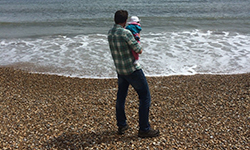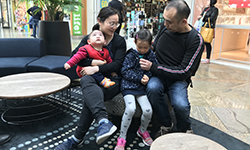Father's Day: colleagues share parental leave experiences
Friday, 14 June 2019

Dr Dan Jones with his daughter
Sunday 16 June was Father’s Day and a good time to remind colleagues across the University about Shared Parental Leave (SPL).
SPL was introduced in 2015 and is a statutory right to share what previously could only be taken as maternity or adoption leave, in a flexible way. The leave arrangements apply equally to same-sex and adoptive parents.
Parents are entitled to 52 weeks in total of combined maternity/adoption leave and SPL, of which the first 39 weeks is paid leave. If you are a University staff member and meet the eligibility criteria, then the first 18 weeks of combined maternity/adoption leave and SPL (per couple) is on full pay, while the remaining 21 weeks is at the statutory rate. More details can be found Shared Parental Leave Policy webpage, or you can contact your HR Advisor.
“Shared Parental Leave is a great symbolic and practical step towards gender equality in parenting.” says Robert Van de Noort, Vice-Chancellor and UEB Gender Champion. “It recognises the importance of both parents in bringing up a child. As the examples below show, the onus is no longer on the mother to take maternity leave while the father goes back to work. Parents can swap or take an equal share of the leave.”
He reminds us also that the University agreed back in 2016 significant investment around SPL and Maternity Leave. “Firstly, the University Executive Board (UEB) agreed that Schools and Functions would be fully reimbursed for the replacement costs when staff take shared parental leave, maternity leave or adoption leave. Secondly, UEB mandated that part of these replacement salary costs are to be spent on the individual returning to work.”
Further details of these arrangements are on the family leave pages, specifically here.
We spoke with three colleagues who have taken shared parental leave or are exploring flexible working arrangements.
Dr Dan Jones, Lecturer
Shared Parental Leave was introduced to bring a little more equality to parenthood in the early stages of a child’s life. Now, there is nothing that can persuade me that anything is equal between men and women when it comes to bringing a new life into the world (I am completely in awe of my wife!). However, SPL does certainly help a little when it comes to the support that a partner can bring to the occasion.
My wife and I both work at the University (it’s actually where we met) and from the first news of pregnancy we were set on doing SPL, it fits nicely with our philosophy of parenthood and we thought it would be good for the whole family. The University were encouraging, and HR were very helpful in organising the logistical side of the operation. My wife and I managed to set out a plan for the whole year: I would take five weeks immediately post-birth and then after a 3-month period of working full-time I would then drop to 3-4 days a week (with my wife going back 1-2 days), utilising annual leave and KIT (keeping-in-touch days) – another example of flexibility with the SPL model.
My experience of SPL has been a positive one. I don’t think one can underestimate how impactful those early stages are. I was grateful that I could be there for the first few weeks to assist, and although I couldn’t do that much just being there was a help. The later stages of SPL, which I am now in, is perhaps more for myself: taking my daughter out, feeding her, bath-time, making her laugh and playing with her is more for me, which I am loving. SPL also brings a perspective that many partners do not gain an insight into: looking after a baby alone is really hard work. Having days where I am solely responsible has shown me this, and I can empathise; going to work is, in many ways, easier than looking after a baby, especially on those teething days! I think this has helped our relationship immensely.
Although not perfect (we both would love to be able to have longer on SPL), I am grateful for the opportunities that SPL brings. Having some one-on-one time with my daughter is truly special and something that I am certainly making the most of (everybody tells me how quickly it goes!). Now at five months old, my daughter’s personality is starting to shine through, and I treasure every minute that I get to spend with her.
Wenhai Ge (Jason), Café Supervisor
Shared Parental Leave has provided us the most precious time as a family on what works best in terms of harmonising family and job commitments.
 Since our first appointment with the UoR HR staff, both Helen and Charli have been keen to introduce us the scheme and explain the benefits of sharing leave. Although this was a completely a new idea to us, the support from HR colleagues made it easier to understand. The whole application process was incredibly smooth as well.
Since our first appointment with the UoR HR staff, both Helen and Charli have been keen to introduce us the scheme and explain the benefits of sharing leave. Although this was a completely a new idea to us, the support from HR colleagues made it easier to understand. The whole application process was incredibly smooth as well.
This scheme has allowed both me and my wife to spend good quality time with our little one. Growing up with both parents around definitely has positive physical and mental effect on a child’s development. In addition, it has also significantly reduced financial pressure on our family.
I am extremely grateful for being able to spend time with my little one. More importantly, my wife is able to get my support whenever she needs me to be around. This is particularly good for parents and their babies.
Overall, the scheme has enriched the childcare options for both parents and helped us achieve a better work life balance. Beyond that, it is also good for the organisation because happy staff tend to be more engaged and productive. Shared Parental Leave is certainly something I would encourage colleagues to consider.
King Wong, IT Business Partner
It is almost three years since I first shared my experience of taking Shared Parental Leave, and Luke will start primary school in September. It has been a wonderful journey so far to see him start nursery, to be engaged in structured learning, and to develop those social skills to make an easier transition into big school. He is already very excited about being able to go to the same school as his big sister Alex. This has prompted my wife and I to re-evaluate our care arrangements.
Following my positive experience with SPL, I have applied for flexible working. This reflects my change in circumstance becoming the primary care giver. It will allow me to pick up the children at the end of the school day; to be able to take them to the park to play with their friends; to make their tea and to help them with their school work. More importantly I will be able to support them with any issues they may have at school.
Looking back SPL was hugely rewarding and it is disappointing to read that nationally take-up has been low to date at between 2% and 8% of eligible parents. I would strongly encourage colleagues to take this opportunity if it suits their circumstances.
